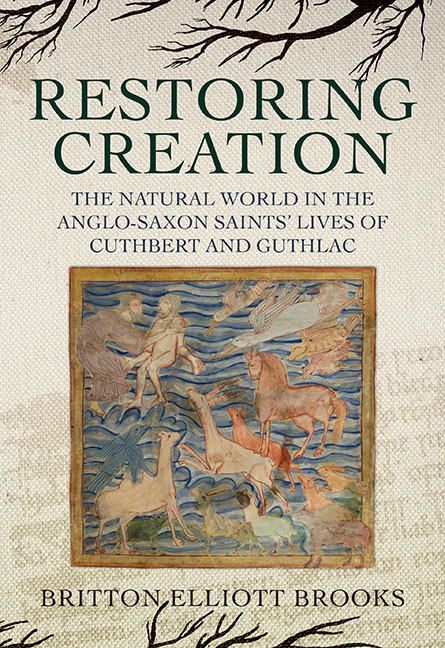 Restoring Creation: The Natural World in the Anglo-Saxon Saints' Lives of Cuthbert and Guthlac
Restoring Creation: The Natural World in the Anglo-Saxon Saints' Lives of Cuthbert and Guthlac Book contents
- Frontmatter
- Contents
- Acknowledgements
- Abbreviations
- Introduction
- 1 Monastic Obedience and Prelapsarian Cosmography: The Anonymous Vita Sancti Cuthberti
- 2 Ruminative Poetry and the Divine Office: Bede's Metrical Vita Sancti Cuthberti
- 3 Bede's Exegesis and Developmental Sanctity: The Prose Vita Sancti Cuthberti
- 4 Enargaeic Landscapes and Spiritual Progression: Felix's Vita Sancti Guthlaci
- 5 Landscape Lexis and Creation Restored: The Old English Prose Life of Guthlac and Guthlac A
- Conclusion: Afterlives of Cuthbert and Guthlac
- Bibliography
- Index
2 - Ruminative Poetry and the Divine Office: Bede's Metrical Vita Sancti Cuthberti
Published online by Cambridge University Press: 18 September 2019
- Frontmatter
- Contents
- Acknowledgements
- Abbreviations
- Introduction
- 1 Monastic Obedience and Prelapsarian Cosmography: The Anonymous Vita Sancti Cuthberti
- 2 Ruminative Poetry and the Divine Office: Bede's Metrical Vita Sancti Cuthberti
- 3 Bede's Exegesis and Developmental Sanctity: The Prose Vita Sancti Cuthberti
- 4 Enargaeic Landscapes and Spiritual Progression: Felix's Vita Sancti Guthlaci
- 5 Landscape Lexis and Creation Restored: The Old English Prose Life of Guthlac and Guthlac A
- Conclusion: Afterlives of Cuthbert and Guthlac
- Bibliography
- Index
Summary
Bede's metrical Vita Sancti Cuthberti (VCM) occupies a unique place in hagiography. Chronologically it is the second life of Saint Cuthbert and, if the extant manuscripts are any indication, it was widely influential, especially in the mid-tenth century. It is also the only extant verse saint's life composed by Bede. Scholars have discussed its relation to Latin metrics, its place in the opus geminatum tradition in England, and its relation to the development of Bede's ideas concerning Cuthbert as they relate to his later VCP. The VCM has, however, received remarkably little critical attention as a text in its own right. Bede's VCM, I will argue here, anticipates his reshaping of Cuthbert in the VCP into an idealised Gregorian monk-pastor, by emphasising Cuthbert's monastic obedience in observing the Divine Office. Further still, the VCM, in form and content, was not only a ruminative and poetic exercise for Bede himself, but also was designed as a text for a monastic audience as an aid for rumination and meditation.
The VCM was likely composed during the reign of Osred, between 705 and 716. On the basis of Bede's positive descriptions of the king in lines 552–55, such as the reference to him as ‘venerabile’, and as a new Josiah in lines 554–55, Michael Lapidge posits a date of composition during the early period of Osred's reign, between 705 and 707. These positive references to Osred are in direct contrast to the portrayal of the later part of his reign, during which he becomes, in Lapidge's phrase, ‘a wicked Ahab, defiling nuns and murdering noblemen’. Lapidge has also identified two distinct recensions of the poem. The first recension, which Lapidge categorises as the B-recension after the single manuscript witness, Besançon, Bibliothèque municipale 186, represents an early draft of the poem by Bede, potentially close to the initial version produced between 705 and 707. The second recension, comprising nearly twenty manuscripts, which Lapidge terms the vulgate version, represents a revised text produced by Bede in connection with his subsequent composition of the VCP, sometime after 721.
- Type
- Chapter
- Information
- Restoring Creation: The Natural World in the Anglo-Saxon Saints' Lives of Cuthbert and GuthlacThe Natural World in the Anglo-Saxon Saints’ Lives of Cuthbert and Guthlac, pp. 67 - 122Publisher: Boydell & BrewerPrint publication year: 2019


